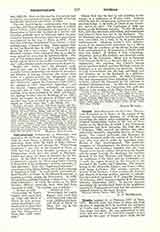

Ubiquitarians (UBIQUISTS), a Protestant sect started at the Lutheran synod of Stuttgart, December 19, 1559, by John Brenz, a Swabian (1499-1570). Its profession, made under the name of Duke Christopher of Wurtemberg, and entitled the “Wurtemberg Confession“, was sent to the Council of Trent, in 1552, but had not been formally accepted as the Ubiquitarian creed until the synod at Stuttgart. Luther had upset the peace of Germany by his disputes. In the effort to reconcile and unite the contending forces against the threatening Turks, Charles V demanded of the Lutherans a written statement of their doctrines. This—the “Augsburg Confession “—was composed by Melanchthon, and read at a meeting at Augsburg in 1530. Its tenth article concerned the Real Presence of Christ in the Blessed Sacrament, a burning question among the Protestants. In 1540, Melanchthon published another version of the “Augsburg Confession.”, in which the article on the Real Presence differed essentially from what had been expressed in 1530. The wording was as follows:—
Edition of 1530
“Concerning the Lord’s Supper, they teach that the body and blood of Christ are truly present, and are distributed (communicated) to those that eat in the Lord’s Supper; and they disapprove of those that teach otherwise.”
Edition of 1540
“Concerning the Lord’s Supper, they teach that with bread and wine are truly exhibited the body and blood of Christ to those that eat in the Lord’s Supper.”
Johann Eck was the first to call attention to the change, in a conference at Worms, 1541. Debates followed, and the Ubiquitarian controversy arose, the question being: Is the body of Christ in the Eucharist, and if so, why? The Confession of 1540 was known as the Reformed doctrine. To this Melanchthon, with his adherents, subscribed, and maintained that Christ’s body was not in the Eucharist. For, the Eucharist was everywhere, and it was impossible, they contended, for a body to be in many places simultaneously. Adopting Luther’s false interpretation of the communicatio idiomatum (q.v.), Brenz argued that the attributes of the Divine Nature had been communicated to the humanity of Christ which thus was deified. If deified, it was everywhere, ubiquitous, just as His divinity, and therefore really present in the Eucharist. Brenz was in harmony with Catholic Faith as to the fact, but not as to the explanation. His assertion that Christ’s human nature had been deified, and that His body was in the Eucharist as it was elsewhere, was heretical. Christ, as God, is everywhere, but His body and blood, soul and divinity, are in the Eucharist in a different, special manner (sacramentally). In 1583, Chemnitz, who had unconsciously been defending the Catholic doctrine, calmed the discussion by his adhesion to absolute Ubiquitarianism. In 1616 the heresy arose again as Kenoticism and Crypticism, but sank into oblivion in the troubles of the Thirty Years War.
JOSEPH HUGHES

